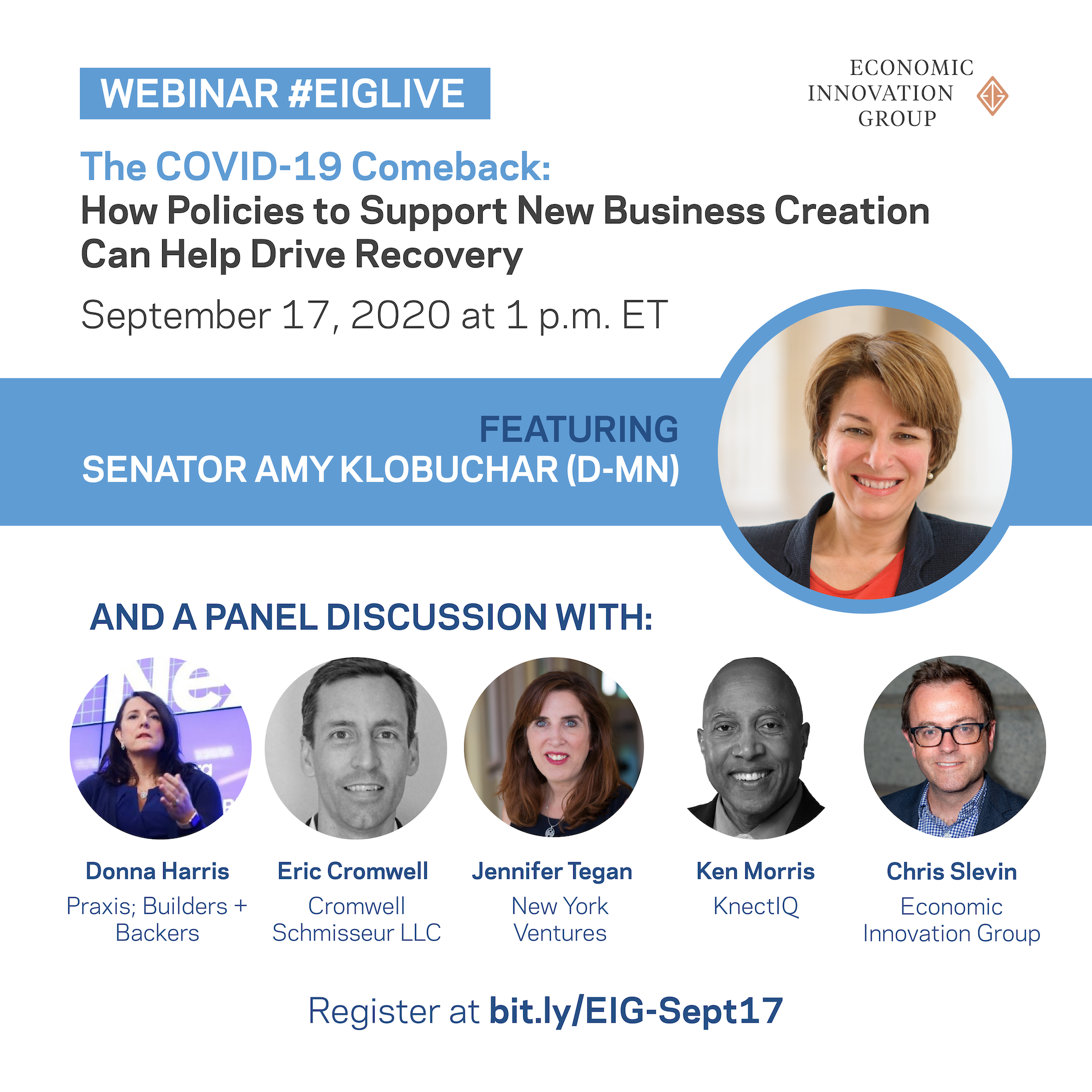On September 17, the Economic Innovation Group (EIG) held a webinar featuring a conversation between Senator Amy Klobuchar (D-MN) and EIG’s Vice President Chris Slevin, followed by a panel discussion with Donna Harris (Venture Partner at Praxis and Founder of Builders + Backers), Eric Cromwell (Founding Member of Cromwell Schmisseur LLC), Jennifer Tegan (New York Ventures), and Ken Morris (Founder and CEO of KnectIQ), moderated by Slevin.
Senator Klobuchar discussed the importance of legislation like the New Business Preservation Act, which she introduced in March, in jumpstarting the economic recovery, how to garner bipartisan support for the legislation, and future possibilities for promoting innovation through improvements to competition policy. The panelists exchanged ideas on how to make entrepreneurship more accessible, especially for women and minorities, emphasizing the importance of local support for entrepreneurship and the outsized influence of venture capital on startup ecosystems.
View a recording of the webinar and EIG’s key takeaways for more information.
Key Takeaways
The Need for an Entrepreneurial Economy
- Senator Klobuchar highlighted the reality that entrepreneurship in America was stagnating even before the COVID-19 pandemic. “We were working on this [legislation] because we’ve seen this start-up slump in our country in the last few years, and I think we all know that it’s been the startups that have driven so many of the small and big companies and much of the job creation in our country,” Sen. Klobuchar said.
- Donna Harris discussed America’s lack of a national culture and national funding infrastructure around entrepreneurship. With innovation locked in a few key metropolises, entrepreneurship elsewhere is locked in a “spiral of distress” as most other communities lack the capital or support for local entrepreneurs.
- “Entrepreneurship is the giant lever that we have and that we have to pull here if we’re going to create the jobs,” Harris said. “It’s how we’re going to actually ideate and come up with new ways to tackle these challenges, and it’s how our communities can restore a sense of agency and ownership.”
Uplifting Women- and Minority-owned Small Businesses
- Women- and minority-owned small businesses often struggle to receive capital or access the resources necessary for success. Senator Klobuchar highlighted how her proposed legislation would prioritize businesses founded by women and people of color, saying, “We don’t want to miss the next great inventor because she is a woman or a minority … I think we’ve seen this all come in technicolor this summer with what was going on with the effect [of the pandemic] on minority communities, but then of course really brought in a big way after the murder of George Floyd in my state. The answer is, of course, police reform and other things, but the answer is also investing in these communities and entrepreneurs.”
- Jennifer Tegan highlighted New York State’s success in funding women entrepreneurs, with 48 percent of investment going to women and minority-owned businesses. She additionally highlighted the vulnerabilities of these businesses in light of the pandemic: “If you look at women and minority entrepreneurs and the sources of capital that they’ve traditionally have access to, it’s more expensive capital, so the margin that they’re working with relative to surviving something like an economic downturn is very thin,” Tegan said.
- Ken Morris noted that the traditional concept of an entrepreneur, such as an individual like Bill Gates or Steve Jobs, often fails to account for the “generational assets” backing these founders and their ideas: “necessary fuel and capital” which is not always there for entrepreneurs coming from less wealthy backgrounds or from communities without local capital and networks.
Removing Roadblocks to Entrepreneurship
- Entrepreneurs face many challenges in their endeavors, some of which could be solved through legislation. Eric Cromwell pointed out that the federal government spends billions in funding basic research, but a “gap” exists in federal support for early stage equity finance. Cromwell says that this gap prevents the commercialization of innovation coming from basic research, and that the New Business Preservation Act could help fill this gap.
- Senator Klobuchar emphasized the importance of reforming competition policy as a priority for sparking innovation in the economy, saying that she was “really interested” in working on the legislative aspect of competition policy. “In recent years, [our competition policy] has faded. Part of it is because of court opinions, part of it is that we haven’t really adapted to this new environment with these big mega companies and how we’re going to question mergers and how we’re going to make sure monopsonies are covered,” Klobuchar said.
Prioritizing Local Investment
- Resources for entrepreneurs are often clustered in a few metropolitan areas, such as Silicon Valley, locking out entrepreneurs in other areas of the country. This “constrains” innovation development, Cromwell said, innovation that is needed on a state-by-state basis.
- Initiatives such as the State Small Business Credit Initiative (SSBCI) helped states support local entrepreneurs, as detailed by Tegan in her experience with New York’s SSBCI, a $46 million fund that created more than 2200 jobs and drove $333 million in co-investment from the private sector.
Going Beyond Venture Capital
- The panelists discussed the outsized role of venture capital in entrepreneurship extensively, highlighting the focus that entrepreneurs have on acquiring financial capital as opposed to exploring alternative means of funding or seeking stronger networks and social capital.
- Morris pointed out the tendency for venture capitalists to “pattern match,” investing in companies that are similar to those that have succeeded before. This makes VC funding less accessible to entrepreneurs in communities with high barriers to entry. “We tend to see all the normal barriers that all entrepreneurs face—access to capital, the relevant networks to grow an enterprise, structures around me that are supportive of business generation–and in a lot of communities we don’t really see that,” Morris said. “Great ideas and great talent come out from anywhere, but you don’t know that until you step out of your comfort zone.”
- “When we think about what we’re doing in communities, we become really myopically focused on the financial leg on what should be a three-legged stool. Entrepreneurs need financial capital, social capital and capacity building,” Harris said.
- “Many times policymakers think on this pendulum swing … we’re either going to do a VC initiative or it’s going to be some kind of alternative … and that’s just not a good path forward, because the reality is that it has to be ‘both and,’” Cromwell said.
About the Economic Innovation Group (EIG)
The Economic Innovation Group (EIG) is an ideas laboratory and advocacy organization whose mission is to advance solutions that empower entrepreneurs and investors to forge a more dynamic American economy. Headquartered in Washington, D.C. and led by an experienced, bipartisan team, EIG convenes leading experts from the public and private sectors, develops original policy research, and works to advance creative legislative proposals that will bring new jobs, investment, and economic growth to communities across the nation. For more information, visit eig.org.
###






